The 2023 FIDE World Cup concluded August 24 in Baku, Azerbaijan as both the title and third-place matches were decided after a pair of rapid tiebreak games. Top-seeded GM Magnus Carlsen defeated 18-year-old Indian GM Praggnanandhaa Rameshbabu ("Pragg") 2½–1½ as GM Fabiano Caruana came back from losing his first classical game to Azerbaijani underdog GM Nijat Abasov to win 3–1.
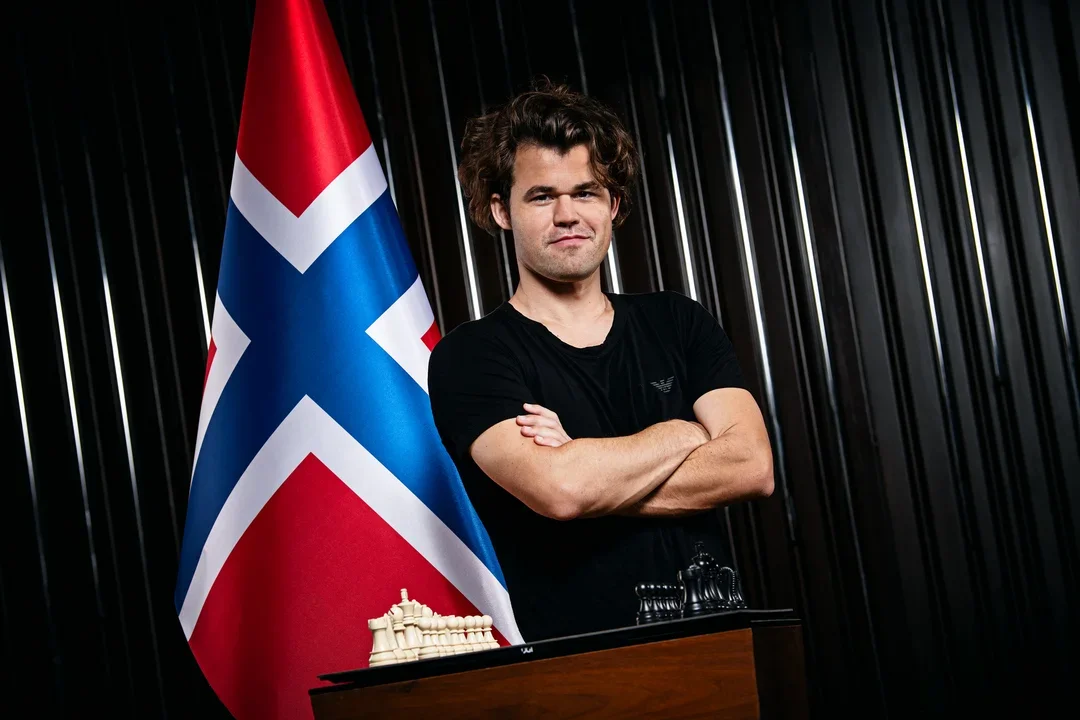
Generally speaking, "Top Seed Wins Tournament" is not the most newsworthy headline, especially when that top-seeded player is GM Magnus Carlsen. But due to the unique (read: chaotic) single-elimination short-match format of the World Cup (think: March Madness, but with 206 players instead of 68 teams), nothing is guaranteed.
Indeed, in his two previous World Cups, Carlsen finished third in 2021 (losing to eventual champion GM Jan-Krzysztof Duda in the semifinals) and being eliminated in the third round by GM Bu Xiangzhi in the round-of-32 back in 2017.
The top three finishers earned invitations to the 2024 Candidates Tournament held in April in Toronto, with Abasov on deck to earn an invitation if Carlsen indeed declines his invitation. As he has stated throughout the tournament, Carlsen has no intention of playing for a World Championship under the current classical-only format. Indeed, he expressed boredom and disinterest during the classical portions of several of his matches in this event, even opting for a quick draw in his second classical game against Pragg.
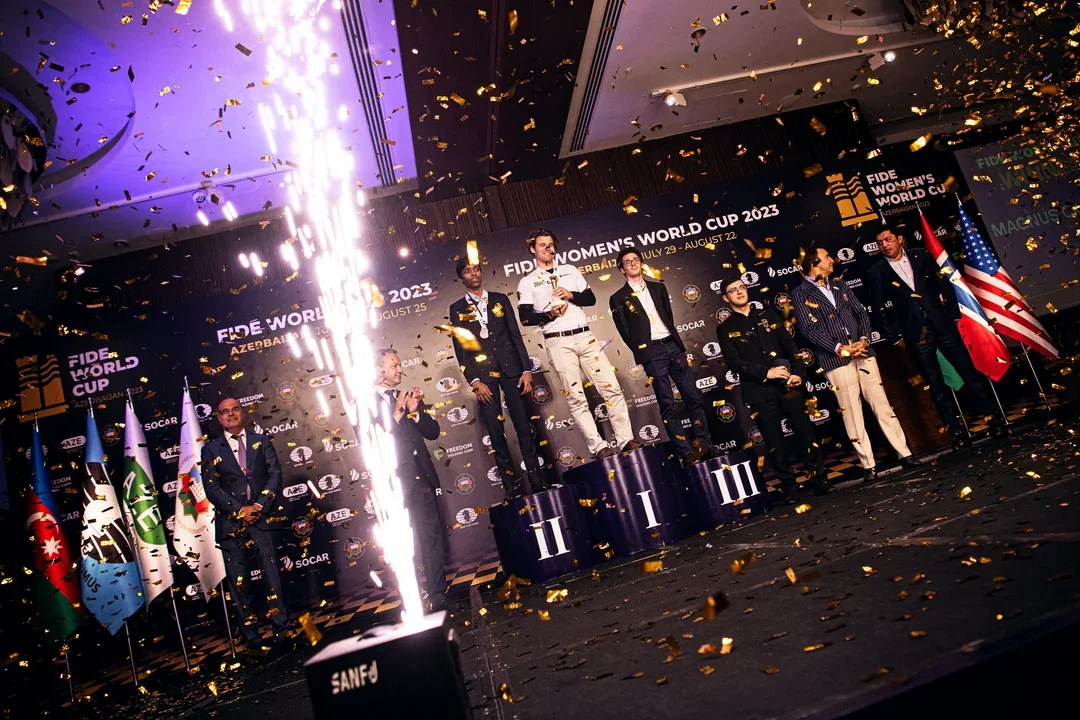
That said, Caruana presumably wanted to be in control of his own destiny rather than leave things up to chance (er...Magnus), making his third-place match a more high-stakes affair than it might have appeared on paper.
In the first game, disaster struck for Caruana as Abasov unveiled a nice opening novelty in the Catalan. Caruana was unable to sense the criticality of his position, going for Abasov's weak d4-pawn before closing down his kingside with a well-timed ... f7-f5, and had to resign shortly thereafter.
In the second game, Caruana at least had the white pieces for his must-win game. Abasov interestingly chose to assist Caruana, playing a sharp Sicilian (apologies for the redundancy) despite only needing a draw. While Abasov made it to move 19 without using any of his time in game one, he started to think as early as move seven here, despite the position still being highly theoretical.
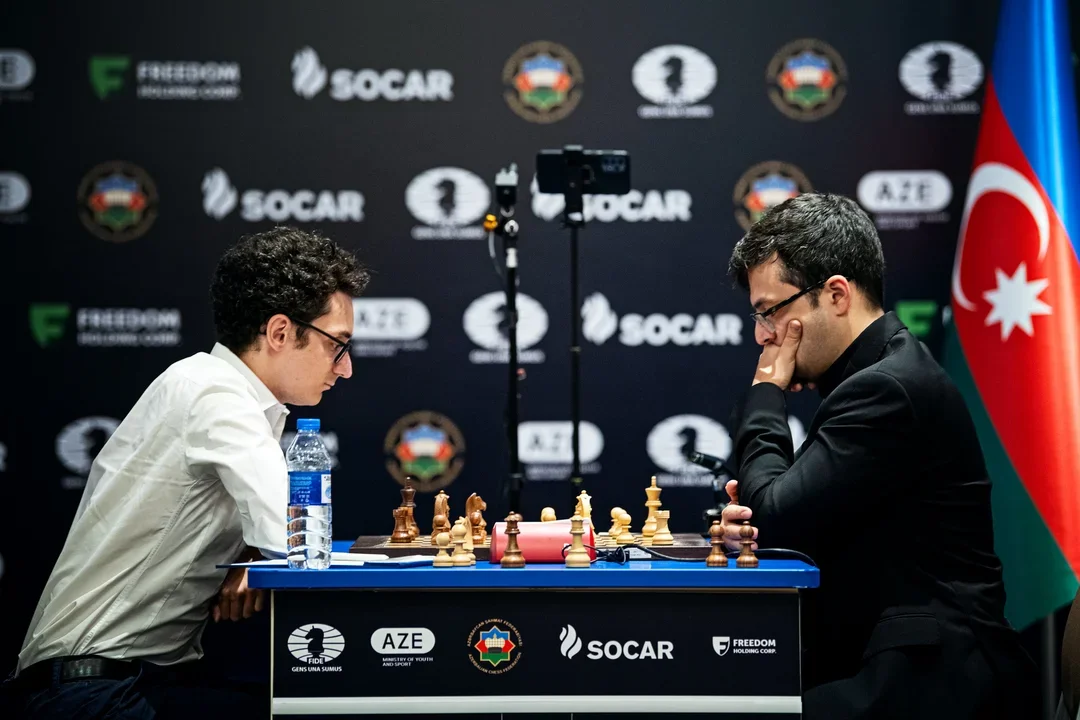
Now, it was Caruana's turn to show off his deep knowledge and prep, navigating the highly imbalanced opening with precision into a position where he was never in any danger. In the resulting Exchange-up position, Abasov would have needed perfect accuracy to hold a draw, but Caruana eventually wore him down.
The playoff took a very different direction with each player seemingly trying to escape theoretical chess as quickly as possible, reaching a novel position in a sideline of the Trompowsky (again, this sounds redundant!) by move four. Caruana took the opportunity to shine as Black, dominating the game and showing how he has become a force in rapid chess over the past few years.
Abasov then had his own must-win game, but Caruana was able to control matters from the start in his favored Rossolimo Variation of the Sicilian, achieving a won position before Black could develop a piece!
The 3–1 come-from-behind victory was a nice exclamation mark on a strong performance from Caruana, guaranteeing his spot in the next Candidates. Presumably, Abasov and his impressive preparation will be there as well, unless Carlsen has a change of heart about playing classical chess.
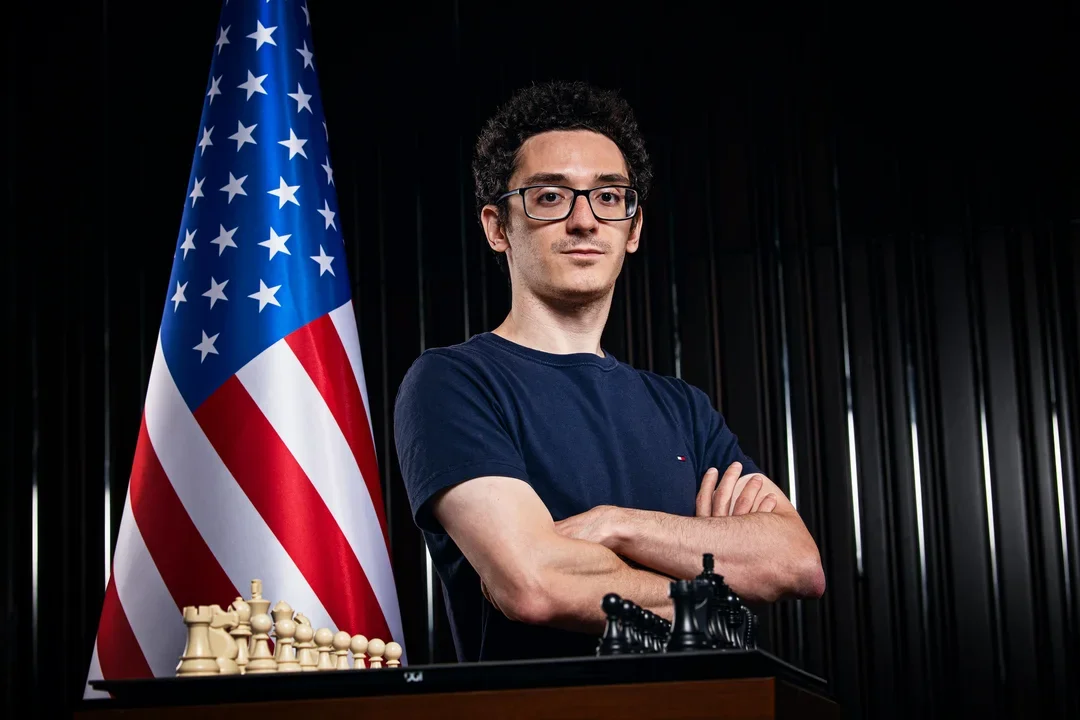
Speaking of classical chess, Carlsen's own match was primarily decided in the rapid portion. Admittedly, Carlsen said he was recovering from a bout of food poisoning, explaining in particular why his second game (as White) was clearly trying to force a tiebreak.
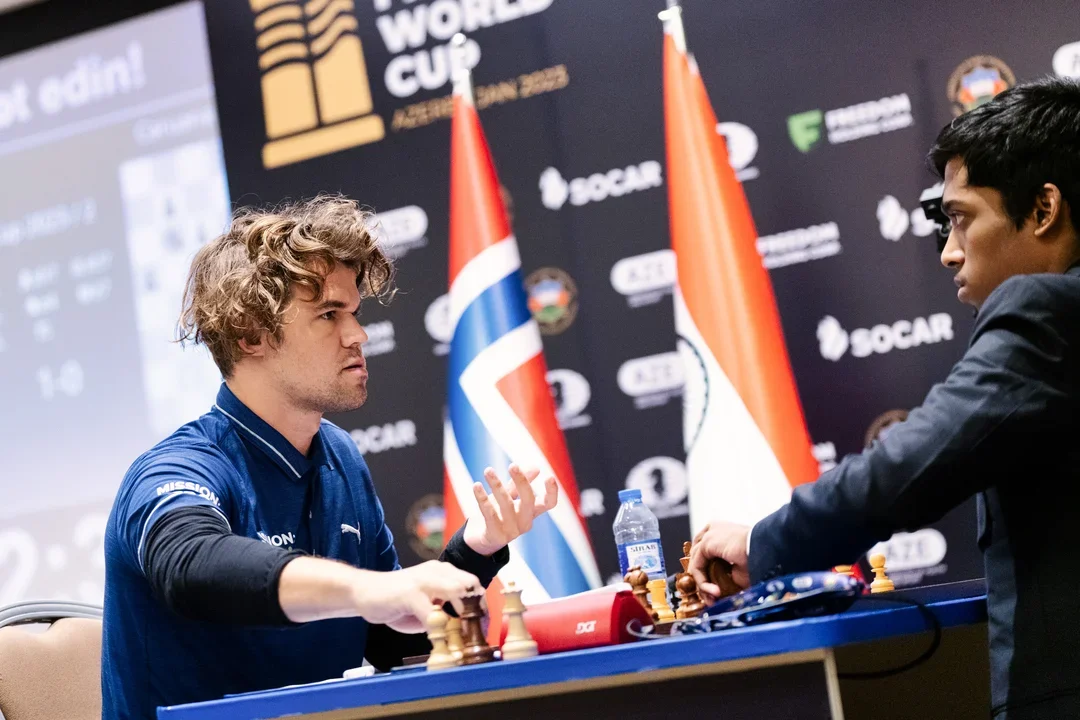
But, in round one, Pragg had some interesting ideas in the English Opening, showing that he could certainly keep up with the highest rated player in the world.
In the first rapid game, Pragg switched to his preferred 1. e4, with Magnus choosing to enter into Pragg's Italian rather than test his Sicilian preparation. Pragg was prepared in an interesting sideline with 7. Be3, and the game became tense shortly thereafter. Carlsen baited Pragg into pushing a little too hard on the kingside, showing the power of experience in rapid chess, and had a slight advantage for most of the queenless middlegame. But Pragg managed to hold on nicely for quite some time, until impatience got the best of him.
After drawing the next game rather quickly, Carlsen was finally able to add a World Cup trophy to his collection. Pragg should, of course, be thrilled with a second-place finish and an invitation to the Candidates. Additionally, match experience against Carlsen should prove invaluable.
Carlsen won $110,000 USD for his match, with Pragg banking a cool $80,000 for second. Caruana won $60,000 for third and Abasov $50,000 for fourth. The total prize fund was $1,834,000.
Categories
Archives
- January 2026 (3)
- December 2025 (27)
- November 2025 (29)
- October 2025 (39)
- September 2025 (27)
- August 2025 (29)
- July 2025 (43)
- June 2025 (25)
- May 2025 (24)
- April 2025 (29)
- March 2025 (29)
- February 2025 (20)
- January 2025 (24)
- December 2024 (34)
- November 2024 (18)
- October 2024 (35)
- September 2024 (23)
- August 2024 (27)
- July 2024 (44)
- June 2024 (27)
- May 2024 (31)
- April 2024 (51)
- March 2024 (34)
- February 2024 (25)
- January 2024 (26)
- December 2023 (29)
- November 2023 (26)
- October 2023 (37)
- September 2023 (27)
- August 2023 (37)
- July 2023 (47)
- June 2023 (33)
- May 2023 (37)
- April 2023 (45)
- March 2023 (37)
- February 2023 (28)
- January 2023 (31)
- December 2022 (23)
- November 2022 (32)
- October 2022 (31)
- September 2022 (19)
- August 2022 (39)
- July 2022 (32)
- June 2022 (35)
- May 2022 (21)
- April 2022 (31)
- March 2022 (33)
- February 2022 (21)
- January 2022 (27)
- December 2021 (36)
- November 2021 (34)
- October 2021 (25)
- September 2021 (25)
- August 2021 (41)
- July 2021 (36)
- June 2021 (29)
- May 2021 (29)
- April 2021 (31)
- March 2021 (33)
- February 2021 (28)
- January 2021 (29)
- December 2020 (38)
- November 2020 (40)
- October 2020 (41)
- September 2020 (35)
- August 2020 (38)
- July 2020 (36)
- June 2020 (46)
- May 2020 (42)
- April 2020 (37)
- March 2020 (60)
- February 2020 (38)
- January 2020 (45)
- December 2019 (34)
- November 2019 (35)
- October 2019 (42)
- September 2019 (45)
- August 2019 (56)
- July 2019 (44)
- June 2019 (35)
- May 2019 (40)
- April 2019 (48)
- March 2019 (61)
- February 2019 (39)
- January 2019 (30)
- December 2018 (29)
- November 2018 (51)
- October 2018 (45)
- September 2018 (29)
- August 2018 (49)
- July 2018 (35)
- June 2018 (31)
- May 2018 (39)
- April 2018 (31)
- March 2018 (26)
- February 2018 (33)
- January 2018 (30)
- December 2017 (26)
- November 2017 (24)
- October 2017 (30)
- September 2017 (30)
- August 2017 (31)
- July 2017 (28)
- June 2017 (32)
- May 2017 (26)
- April 2017 (37)
- March 2017 (28)
- February 2017 (30)
- January 2017 (27)
- December 2016 (29)
- November 2016 (24)
- October 2016 (32)
- September 2016 (31)
- August 2016 (27)
- July 2016 (24)
- June 2016 (26)
- May 2016 (19)
- April 2016 (30)
- March 2016 (36)
- February 2016 (28)
- January 2016 (32)
- December 2015 (26)
- November 2015 (23)
- October 2015 (16)
- September 2015 (28)
- August 2015 (28)
- July 2015 (6)
- June 2015 (1)
- May 2015 (2)
- April 2015 (1)
- February 2015 (3)
- January 2015 (1)
- December 2014 (1)
- July 2010 (1)
- October 1991 (1)
- August 1989 (1)
- January 1988 (1)
- December 1983 (1)







